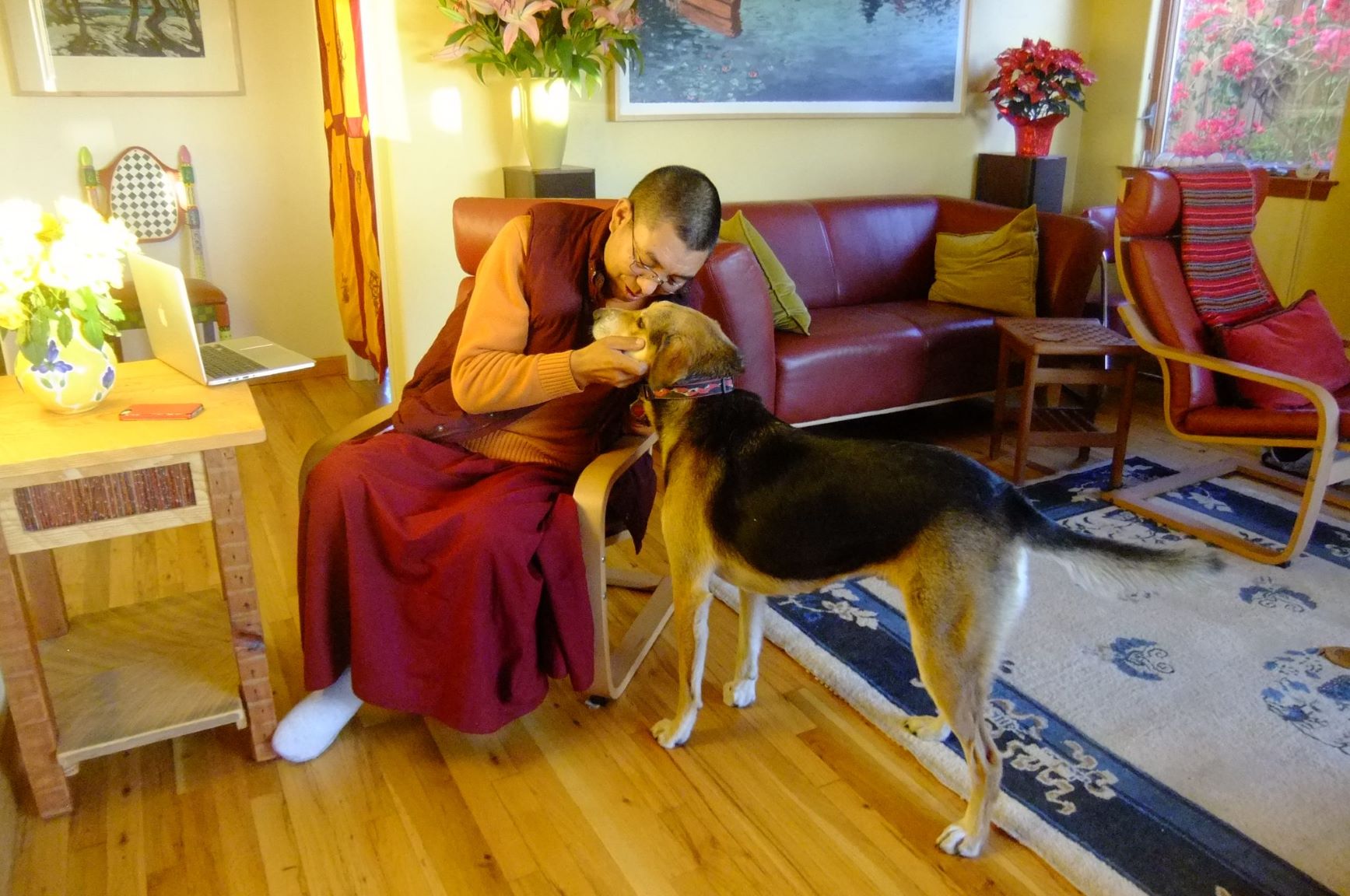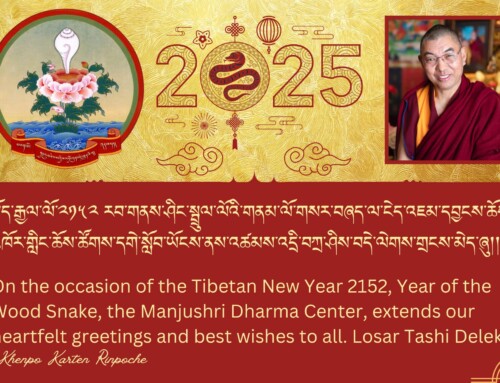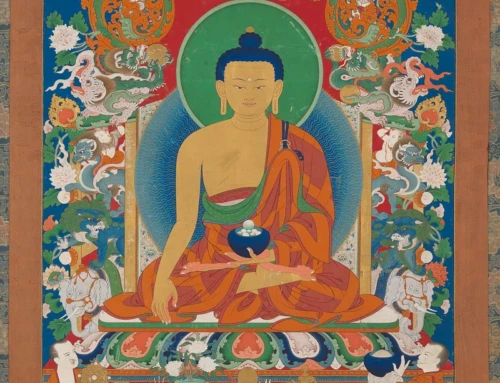“No matter how much glory, wealth,
fame or knowledge we may have
Pride never raises us higher;
Always keep a humble position. That is my heart advice.”
This is the 12th verse from my book the “Heartfelt Advice of Dharma Nectar.” To be humble is an essential part of practicing Mahayana Buddhism. This is based on the premise that as one does not wish to be harmed in any way, likewise other beings have the same wish not to be hurt or mistreated, and one should not harm others. This is the universal ‘Golden Rule’ of do unto to others as you want them to do unto you. This is the most basic minimum requisite of being humble, but Buddhism aspires to develop this concept further to achieve a state where one must sacrifice oneself for the benefit of others. From a Mahayana Buddhist view, one must ideally let go of oneself completely for the sake of others, irrespective of personal loss. For a Buddhist practitioner, the next life is given more importance than this life and others’ well-being is much more important than one’s own. Therefore, the practice of humility becomes extremely precious to a Mahayana Buddhist practitioner.
Now, when one dwells on the kind of environment to be humble in, the Tibetan Buddhist texts express this view of equanimity to all sentient beings as magen semchen thamche often rendered as “mother sentient beings”. One may say, I only have one mother, how can everyone be my mother? It is difficult for some people to accept the notion of karma and reincarnation, but this is central to Buddhism, and in this blog I will not go into great detail. Consider that since beginningless time, we have been incarnating and revolving in the cycle of samsara in innumerable forms. In this life, you identify your mother as the woman who gave birth to you, nurtured you, etc. But this is just this lifetime; throughout countless incarnations, we have had innumerable mothers in each life. Therefore, this outlook stems from the perspective that all sentient beings have been at one time one’s own mother. Individuals with such a view can truly generate feelings of equanimity and develop an empathy for others as being one’s own mother. As such, there cannot exist the concept of an “enemy”.
Some of my students have expressed that, throughout their life circumstances, they did not have good relations with their mother or parents. Thus, they have said that this view does not appeal to them. As I have said before in my ‘Mother’s Day’ blog post, no matter how your parents treated you, it was your karma to have them as your parents who gave you this life. I think it is mistaken to simply say, “My parents didn’t treat me well,’ and to consider them to be terrible people. To respect, serve, and look after your parents is not just Buddhadharma; it is an upstanding, noble way of living from any perspective. Plus, if you don’t treat your parents well, when you have children of your own, the likely result of that karma ripening will be that they become a big problem for you, and cause you a lot of irritation and annoyance!
So, even when an individual without an experience of having a mother meditates on the well-being of others and regards everyone else as precious in this light, this consistent practice gradually empowers the mind to genuinely experience all sentient beings as one’s own mother. This develops to such an extent to which the practitioner voluntarily longs for the betterment of others and there is no question of treating others unkindly and no basis for viewing others as adversaries. Instead of seeking happiness and benefit for oneself, on the contrary, the practitioner becomes more inclined towards empathy for the well-being of others even at the expense of oneself. For a Mahayana practitioner, there is no other way than to develop a genuine sense of joy for others well-being, arising out of extreme humility. As Geshe Langri Thangpa has written in the second verse of the “Eight Verses of Training the Mind”:
Whenever I’m in the company of others,
I will regard myself as the lowest among all,
And from the depths of my heart
Cherish others as supreme.
So, this is the Buddhist perspective of humility.
In primarily non-Buddhist environments like the West, children are brought up with a very strong idea of individuality. Much emphasis is placed on the self throughout childhood. This leads to an upbringing in a very competitive environment where the self is designated and viewed with such importance that it is sometimes given greater significance than others. Instilled with strong individualism, children are constantly advised not to give into anything or anyone. Within such an environment, it is hard to understand the Buddhist concept of humility.
Also contrary to the Buddhist understanding, being humble in a Western sense is often equated with being submissive to an adversary or even being in a state of servitude. Many perceive it as being unable to respond or react to an action which results in a total loss for oneself and complete victory for the other. In other words, being a failure or a “loser.” However, from a Buddhist perspective, while it is true that in this lifetime one may be subject to some losses, because of the resultant act of humility, immense gain is realized in the end.
As an example, Shantideva and Kadampa masters have said that if you are subjected to an aggressive quarrel or fight, you must not retaliate in a similar manner. It is stated that the most beneficial action is the act of being humble and not to retaliate in a similar way but to act humbly with compassion towards the other. It is not seen as being passive and not doing anything. In fact, in such a situation being humble is the best and most favorable action to take. At every such instance of adversity, if one is able to repeatedly respond with humility and compassion, then the other person – being human – will come to realize that your actions are nonviolent and non retaliatory. This creates an environment where the conflict can come to an end. Being a Buddhist teacher myself, I understand how difficult it is to change one’s mindset. However, through this simple act of being humble and compassionate, you are able to bring about transformation.
His Holiness has constantly mentioned that an attitude of humility and compassion is not only beneficial for the development of others, but most importantly, it is of utmost benefit to oneself. Je Tsongkhapa has also said that by seeking the well-being of others, one automatically accomplishes one’s own well-being. Self well-being is inclusive with the well-being of others. In the beginning it may seem that being humble is associated with individual loss, but the ultimate victor is the one with humility, compassion, and truth. Therefore, being humble does not mean no action, being idle, or sacrificing everything and facing loss. On the contrary, it means it is the ultimate action of non retaliation and development of a compassionate view for others. So at the end, whether one talks about this life or the next life, humbleness has everything to gain. Humility leads to the ultimate victory in the long run.
Having thus enumerated the benefits of humility, it is beneficial to discuss the flaws of pride. Pride is rooted in ignorance, an inflated sense of self and an exaggeration of what is beyond reality. Based on this ignorant view of the self, one develops pride. So when children are given encouragement based on a false sense of the self, like they are the best and they are like no other, this detachment from reality is a cause of the development of pride. This pride is a result of delusion.
Pride is of two kinds. One arises as a result of self cherishing and supported by delusion and afflicted emotions. The other type of pride is devoid of afflicted emotions and has a sense of confidence like “I can” or having a conviction to do something. Bodhisattvas possess this second kind of pride, or faith in oneself. The self-confidence of Bodhisattvas arises from the immense courage developed for the well-being of others. Viewing others as the same as oneself and placing a heightened importance for others’ benefit is the basis of a Bodhisattva’s confidence. The Tibetan word Jangchup Sempa Chenpo means Bodhisattva. The morpheme ‘pa’ connotes heroism, the heroic aspect of viewing others with compassion. This intense desire to attain enlightenment in order to eliminate the sufferings of sentient beings brings about this second kind of confidence. ‘Chenpo’ means big, great, or elaborate – elaborate in the sense that no matter how much the suffering, one has the courage, confidence, and desire to alleviate the suffering of others. So this Bodhisattva kind of confidence is the one that is to be aspired to. Thus, the common understanding that being humble results in being a loser is actually not valid.
Self pride not only hinders harmony of a family setting but it also does not bode well for a society as a whole. This self cherishing and pride from a Buddhist perspective is seen as ignorance. I want to share my own personal story from my youth.
When I was young and studying at my uncle’s monastery in Tibet, I was considered a capable student and did very well in my academics. My compositional skills were good and so was my dialectics. At one instance, after we received teachings from a Khenpo, we were all outside in the open courtyard taking part in a debate. It is a tradition that is quite boisterous and energetic, if you have ever seen it, with monks standing over their seated debate partners, mala hanging from the arm, shouting and clapping their hands upon making their point. I was not very good at debate, at least not compared to other areas of study, but one day I was vehemently debating another monk who was very humble. As I was bettering my opponent, and I became very prideful, enjoying the moment. I was young and with the knowledge of being brighter than everyone else, pride pervaded every aspect of my debating skills and manifested in strong derogatory and posturing gestures towards the other monk, such as snapping my fingers and rubbing my opponent’s shaven head.
Unbeknownst to me but all this while, my uncle, Lama Gepel, who was the Master Teacher of the monastery, had been observing this scene from his courtyard window. One day, shortly after that, Uncle told his attendant to usher me into his room. When I entered, I could sense from his facial expression and silence that he was not pleased. So I prostrated to him three times and asked him, “What happened Uncle, what wrong have I done?” I told him that I was number one in my studies and was very diligent and focused.
I must say here that my uncle was blind in one eye at that time. In order to see anyone in conversation, he had to wear very thick glasses. When I entered, his glasses were off, and when I asked him what was wrong, Uncle slowly put his glasses on and glared directly into my eyes. It was quite intimidating.
He then said to me angrily, “I don’t want you to be a monk anymore. Just pack up your robes and go home. Whatever you want to do, just go ahead.” I was shocked, and asked why.
“My nephew, I will tell you,” he replied. “The real purpose of Dharma is to generate an antidote to your afflictive emotions and uproot your delusions. What are you doing here? Do you think what you are doing here is Dharma?” He continued, “I saw you debating through the curtains of my window and your actions do not reflect well as a monk. Your actions mirror your big ego, which is like that mountain, and is not good for you. Bringing his hand down toward the floor, Uncle said, “Your wisdom is here…” then he pointed at the mountain peak outside the window and said, “but your ego is already higher and more massive than Takgo Mountain! Your Dharma brought you jealousy and pride and increased your five poisons which is the exact opposite of Dharma! Your way of thinking now is not in accordance with the principles of Dharma. Medicine has now become poison and is harmful to you! You should stop your studies!”
He reprimanded me and said that at this young age, if I exhibited such pride within myself, then what would become of me later when I would take on the position of being a Khenpo or a senior monk. He said, my ego would be greater than the education and the practice of Dharma would be completely futile. Dharma practice he iterated must become an antidote to the three poisons – pride being one of them. However, if my Dharma practice was instead becoming a fuel for increasing my pride and an aid to enhancing the ego, then there is no meaning to pursue the practice of Dharma anymore. Instead, I should give up being a monk immediately and pursue some other course. To this day I remember his words vividly.
Now in the context of a Western environment, if an uncle were to witness his nephew exhibiting great performances in front of a big crowd, the uncle would perhaps shower him with added encouragement and say “you are the best”, further bolstering his ego. Like my uncle had said this would further add fuel to the already inflated ego of his nephew. However, as I was born in Tibet and brought up in a different culture, my uncle gave me a very different set of advice which is contrary to the culture we live in today. So this type of advice was very common at that time. Before going to school, Tibetan parents would advise their children to be humble and considerate to others. When we were young, our teachers would also advise us similarly. Therefore, within the teachings of the Dharma in comparison to other defilements like attachment, jealousy, ignorance etc., self pride is considered to be the most potent. Even in daily life, when an individual full of self pride meets another similar individual, there is no room for coexistence. The short-sighted nature of cherishing oneself does not provide grounds for a harmonious society. A person who lies for an immediate profit may accomplish some gain for an instant. However, in the long run people will realize and associate the lie with the person being unreliable. Therefore, self cherishing manifests in our outward behavior and results in disharmony within family and society as a whole.
For a Dharma practitioner like myself, I feel humility has very magnanimous qualities. When another person is afflicting harm it is possible to see that the action is carried out of ignorance and shortsightedness. With the action of humility there is an opportunity to create a space where the aggressor is able to realize their shortcomings – which could lead to a better relationship between the two.
I, Khenpo Karten Rinpoche, dictated this message in July of 2021 in order to expound the benefits of humility and the faults of pride. This blog was translated and transcribed by Dechen Baltso, through a series of conversations and audio recorded messages, and further edited by my student, Karma Choeying. Originally published on July 23rd, 2021 on Rinpoche’s Blogspot.




